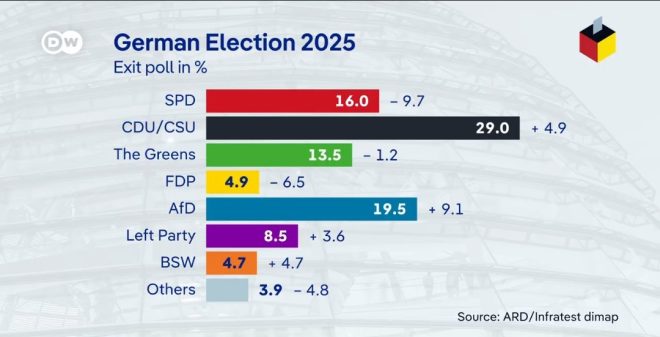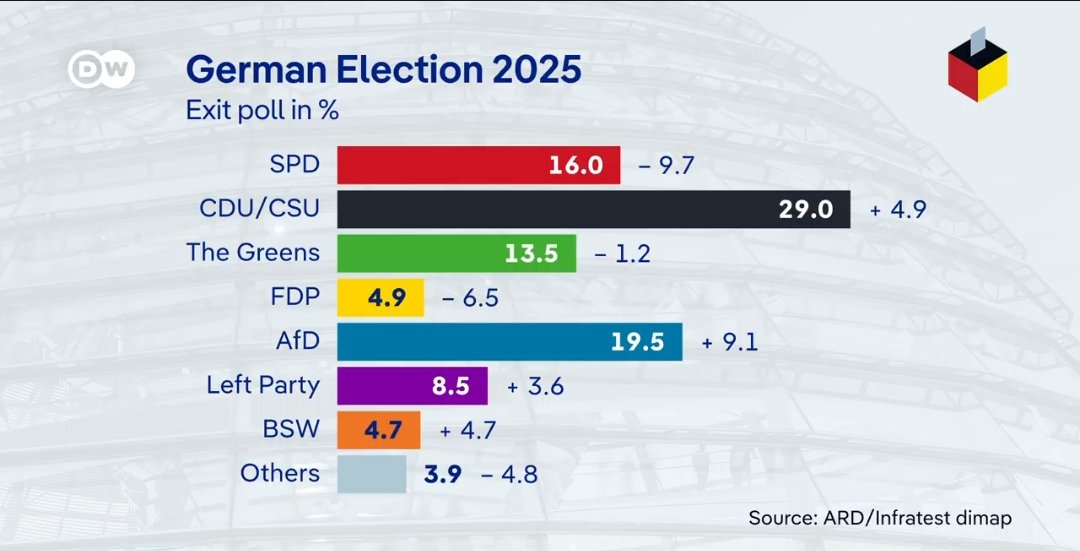
German Election Exit Polls Reveal CDU Victory
Recent exit polls from Germany indicate a significant shift in the political landscape, with the Christian Democrat Union (CDU) projected to win the election by a substantial margin. According to the latest data, the CDU is expected to secure approximately 29% of the votes, marking a remarkable turnaround for the party. The polls also suggest that the Alternative for Germany (AfD), which has garnered notable support, is predicted to receive around 19.5% of the votes, surpassing the current ruling party, the Social Democratic Party (SPD), which is anticipated to obtain only 16%.
The Political Landscape in Germany
The shift in voter sentiment reflects changing attitudes within the German electorate. The CDU’s resurgence can be attributed to various factors, including dissatisfaction with the current SPD government and a growing inclination towards conservative policies. Under the leadership of newly appointed CDU candidates, the party has successfully reconnected with voters who may have felt alienated in previous elections.
The CDU’s Comeback
The CDU, once the dominant political force in Germany, faced significant challenges in recent years, particularly following the departure of long-time leader Angela Merkel. However, the party has managed to rejuvenate its image and policies, appealing to both traditional supporters and new voters. Key issues such as economic stability, immigration control, and public safety have resonated with the electorate, leading to an increase in support for the CDU.
The Rise of the AfD
In what is perhaps one of the most noteworthy aspects of the exit polls, the AfD’s projected 19.5% marks a significant achievement for the party. Backed by endorsements from influential figures, including Elon Musk, the AfD has positioned itself as a formidable contender in German politics. The party’s platform, which emphasizes national sovereignty and skepticism towards established political norms, has attracted a growing base of support, particularly among voters disillusioned with traditional parties.
- YOU MAY ALSO LIKE TO WATCH THIS TRENDING STORY ON YOUTUBE. Waverly Hills Hospital's Horror Story: The Most Haunted Room 502
The SPD’s Declining Influence
The exit polls indicate a challenging road ahead for the SPD, the current ruling party. With a projected 16% of the vote, the SPD faces the possibility of losing its position of power. Factors contributing to this decline include criticisms of the party’s handling of economic issues, rising inflation, and public dissatisfaction with its management of the COVID-19 pandemic. The SPD’s inability to effectively communicate its achievements and vision may also play a role in its diminishing popularity.
Implications for German Politics
The results of these exit polls have significant implications for the future of German politics. A CDU-led government could lead to shifts in policy direction, particularly in areas such as immigration and economic management. The rise of the AfD may also prompt established parties to reevaluate their platforms and strategies in response to the growing populist sentiment among voters.
Conclusion
As the political landscape in Germany evolves, the exit polls serve as a critical indicator of voter sentiment and party dynamics. With the CDU poised for a comeback and the AfD gaining traction, the German electorate is signaling a desire for change. The SPD’s decline further underscores the need for established parties to adapt to the changing political climate. As the official results are tallied, the implications of these exit polls will undoubtedly shape the future of Germany’s political landscape for years to come.
In summary, the recent exit polls reveal a potential turning point in German politics, with the CDU leading the charge and the AfD positioning itself as a significant player. The SPD’s struggle highlights the challenges faced by traditional parties in a rapidly changing political environment. The outcomes of these elections will be closely watched as Germany navigates its future direction.

JUST IN : German exit polls show the Christian Democrat Union Party winning the German election by a landslide. It also shows the Musk-endorsed AfD beating the current SPD regime.
CDU: 29%
AfD: 19.5%
SPD: 16% pic.twitter.com/etvx0UqaLj— George (@BehizyTweets) February 23, 2025
JUST IN: German Exit Polls Show the Christian Democrat Union Party Winning the German Election by a Landslide
The political climate in Germany has been buzzing with excitement as the latest exit polls reveal astonishing results from the recent elections. The Christian Democrat Union Party (CDU) is making headlines, capturing a significant victory that has many political analysts reevaluating the landscape of German politics. With the CDU securing a remarkable **29%** of the vote, the party seems poised to reclaim its place as a dominant force in the country’s governance.
But what does this mean for Germany? The CDU, under its new leadership, has been campaigning vigorously, focusing on issues that resonate with voters. From economic stability to security concerns, the party has presented a vision that seems to have struck a chord with the electorate. As the dust settles on the election results, it’s clear that the CDU’s message has resonated, leading to what many are calling a landslide victory.
It Also Shows the Musk-Endorsed AfD Beating the Current SPD Regime
The Alternative for Germany (AfD) party, which has recently gained attention due to endorsements from high-profile figures like Elon Musk, has also made impressive strides. The exit polls show that the AfD has garnered **19.5%** of the votes, allowing it to eclipse the ruling Social Democratic Party (SPD), which stands at **16%**. This shift indicates a significant change in voter sentiment and highlights a growing discontent with the current administration.
It’s fascinating to see how the rise of social media and endorsements from influential figures can sway public opinion. Many voters are drawn to the AfD’s promises of prioritizing national interests and tackling immigration issues, which have become focal points in recent years. The party’s success in these elections suggests that a segment of the population is seeking alternatives to traditional political parties, making the landscape more competitive and dynamic.
The Implications of These Exit Poll Results
So, what do these election results mean for the future of Germany? For starters, the CDU’s victory sets the stage for potential policy shifts and a reevaluation of Germany’s role in European and global politics. With a stronger mandate, the CDU can pursue its agenda more aggressively, addressing economic challenges and security concerns that have been at the forefront of voters’ minds.
For the AfD, their significant showing indicates that they are not just a fringe party anymore. Their rise could lead to a more polarized political environment, as traditional parties may feel pressured to adopt more hardline stances on certain issues to retain their voter base. This change could alter the dynamics of coalition-building in the Bundestag, making it essential for parties to consider their strategies moving forward.
Understanding the CDU’s Campaign Strategy
The CDU’s campaign strategy played a pivotal role in their election success. By focusing on traditional values and economic growth, they appealed to a wide range of voters who may have felt neglected by previous administrations. Moreover, the party’s emphasis on national security resonated with constituents concerned about immigration and crime, tapping into sentiments that have been growing in Europe.
Furthermore, the CDU made effective use of social media and grassroots campaigning to connect with younger voters. Engaging content and direct communication helped bridge the gap between the party and the electorate, showcasing their commitment to addressing the concerns of all citizens. It’s a reminder of how crucial it is for political parties to adapt to the changing landscape of voter engagement.
The Role of the AfD in German Politics
The rise of the AfD is equally intriguing. As they continue to gain traction, their presence in the Bundestag could challenge the traditional parties to rethink their policies and approaches. The AfD’s focus on nationalism and skepticism towards the European Union reflects a broader trend of populism that has been emerging across the continent.
Moreover, the endorsement from figures like Elon Musk, who has a significant following, is likely to amplify their message and attract new supporters. The digital age allows for rapid dissemination of ideas and ideologies, making it crucial for all parties to understand and leverage these platforms effectively.
The Future of the SPD
On the other hand, the SPD, which has found itself trailing behind both the CDU and AfD, needs to critically assess its position and strategy. With only **16%** of the vote, the SPD faces an uphill battle to regain the trust of voters. Their current policies and messaging may need a significant overhaul to resonate with a public that is increasingly looking for alternatives.
The SPD must also analyze the reasons behind their decline. Are they failing to address the pressing issues that matter to voters? Or is their image outdated? Engaging with constituents and understanding their needs will be vital for the SPD if they wish to remain a relevant player in German politics.
Voter Sentiment and the Political Landscape
These election results reflect a shift in voter sentiment that many may have anticipated. Political analysts often discuss the importance of being in tune with the electorate’s feelings, and this election is a testament to that. The CDU’s victory suggests that voters are looking for stability and reliability, while the AfD’s rise indicates a desire for change and a break from the status quo.
This duality presents a unique challenge for the CDU as they navigate the expectations of their supporters while also addressing the concerns raised by the AfD’s platform. Striking the right balance will be critical in maintaining their position and ensuring a stable government moving forward.
The Impact on European Politics
As Germany plays a crucial role in European politics, the outcomes of this election could have far-reaching implications beyond its borders. A strong CDU government may lead to more assertive policies on issues like immigration, economic cooperation, and defense within the European Union. Meanwhile, the AfD’s presence could challenge the EU’s fundamental principles, particularly regarding integration and cooperation.
In a time when Europe faces various challenges, including economic recovery post-COVID and geopolitical tensions, Germany’s political direction is vital. How the CDU and AfD interact with their European counterparts will be watched closely, as it could shape the future of the EU itself.
What’s Next for German Politics?
As the dust settles and the CDU prepares to take the reins, all eyes will be on how they implement their agenda and how the political dynamics evolve. The presence of the AfD will push the CDU to address issues they may have previously sidestepped, leading to a more robust debate on key topics.
Voter engagement will also be crucial moving forward. As the political landscape shifts, it’s essential for all parties to maintain open lines of communication with their constituents. Listening to the public’s concerns and adapting to their needs can significantly influence the success of any political party in the long run.
In summary, the recent German elections have set the stage for a new chapter in the country’s political narrative. With the CDU’s landslide victory and the AfD’s impressive showing, the landscape is more dynamic than ever. The implications of these results will undoubtedly unfold in the coming months, impacting not just Germany but the entire European continent.
